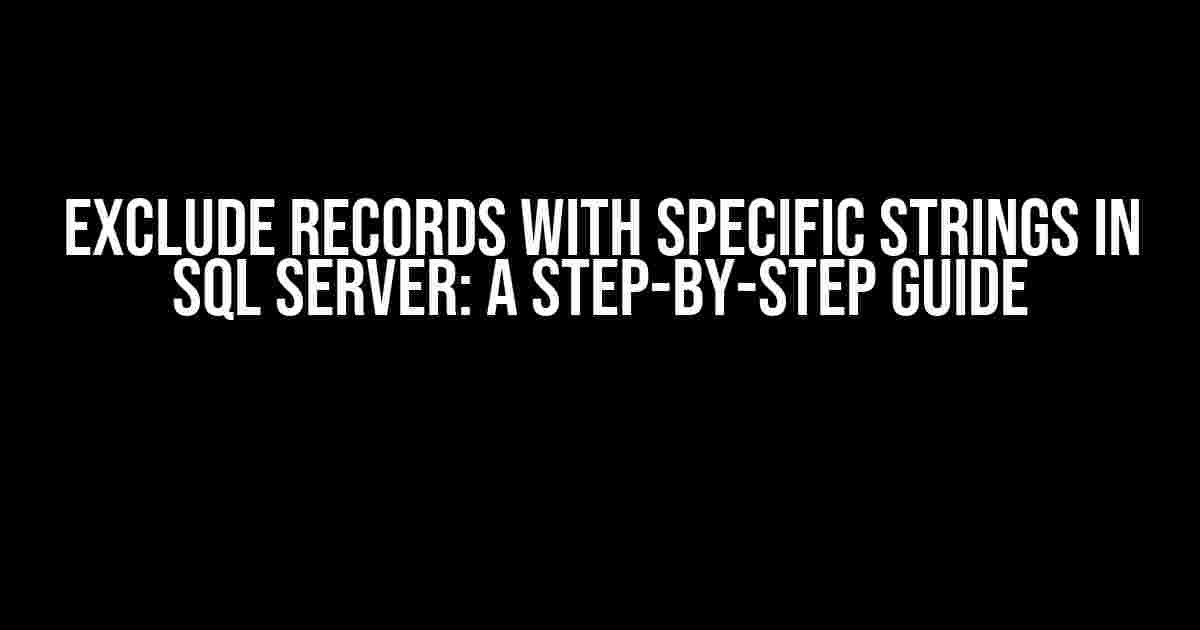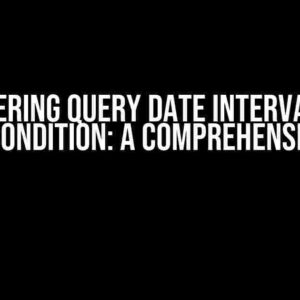Are you tired of dealing with unnecessary data in your SQL Server database? Do you want to refine your queries to exclude records that contain specific strings? Look no further! In this article, we’ll take you on a journey to master the art of excluding records with specific strings in SQL Server. Buckle up and get ready to take your querying skills to the next level!
Why Exclude Records with Specific Strings?
In many cases, you may need to filter out records that contain unwanted strings, such as null or empty values, punctuation marks, or special characters. By excluding these records, you can:
- Improve data quality and consistency
- Enhance query performance by reducing the amount of data to be processed
- Simplify data analysis and reporting
- Prevent errors and inaccuracies in your results
Methods for Excluding Records with Specific Strings
SQL Server provides several methods to exclude records with specific strings. We’ll explore three approaches: using the NOT LIKE operator, the NOT IN operator, and regular expressions.
Method 1: Using the NOT LIKE Operator
The NOT LIKE operator is one of the most straightforward ways to exclude records with specific strings. The syntax is as follows:
SELECT *
FROM YOUR_TABLE
WHERE YOUR_COLUMN NOT LIKE '%STRING_TO_EXCLUDE%';In this example, the query selects all records from the YOUR_TABLE table where the YOUR_COLUMN column does not contain the string STRING_TO_EXCLUDE. The percentage sign (%) is a wildcard character that matches any characters before and after the specified string.
Method 2: Using the NOT IN Operator
The NOT IN operator is another way to exclude records with specific strings. The syntax is as follows:
SELECT *
FROM YOUR_TABLE
WHERE YOUR_COLUMN NOT IN ('STRING_TO_EXCLUDE1', 'STRING_TO_EXCLUDE2', ...);In this example, the query selects all records from the YOUR_TABLE table where the YOUR_COLUMN column does not contain any of the specified strings.
Method 3: Using Regular Expressions
Regular expressions offer a more advanced way to exclude records with specific strings. SQL Server supports regular expressions through the LIKE operator with the ESCAPE clause. The syntax is as follows:
SELECT *
FROM YOUR_TABLE
WHERE YOUR_COLUMN NOT LIKE '%[STRING_TO_EXCLUDE]%' ESCAPE '\';In this example, the query selects all records from the YOUR_TABLE table where the YOUR_COLUMN column does not contain the string STRING_TO_EXCLUDE. The ESCAPE clause specifies the escape character (\) to use in the regular expression.
Real-World Examples
Let’s dive into some real-world examples to demonstrate the power of excluding records with specific strings.
Example 1: Excluding Records with Null or Empty Values
Suppose we have a table called CUSTOMERS with a column called getEmail. We want to exclude records with null or empty email addresses:
SELECT *
FROM CUSTOMERS
WHERE getEmail IS NOT NULL AND getEmail NOT LIKE '';This query selects all records from the CUSTOMERS table where the getEmail column is not null and not empty.
Example 2: Excluding Records with Punctuation Marks
Suppose we have a table called PRODUCTS with a column called productName. We want to exclude records with product names that contain punctuation marks:
SELECT *
FROM PRODUCTS
WHERE productName NOT LIKE '%[!"#$%&'()*+,-./:;<=>?@[\\\]^_`{|}~]%' ESCAPE '\';This query selects all records from the PRODUCTS table where the productName column does not contain any punctuation marks.
Best Practices and Performance Considerations
When excluding records with specific strings, keep the following best practices and performance considerations in mind:
- Use indexes: Create indexes on the columns used in the exclusion criteria to improve query performance.
- Optimize your queries: Use efficient query syntax and avoid using functions in the
WHEREclause. - Use parameterized queries: Use parameterized queries to prevent SQL injection attacks and improve performance.
- Test and refine: Test your queries and refine them as needed to ensure optimal performance and accuracy.
| Method | Advantages | Disadvantages |
|---|---|---|
| NOT LIKE | Easy to use, flexible | May not perform well with large datasets |
| NOT IN | Fast and efficient, easy to read | Limited to a fixed list of strings |
| Regular Expressions | Powerful and flexible, can match complex patterns | May be slow and complex, requires expertise |
Conclusion
In this article, we’ve explored the world of excluding records with specific strings in SQL Server. By mastering the NOT LIKE, NOT IN, and regular expression methods, you’ll be able to refine your queries and extract valuable insights from your data. Remember to follow best practices and performance considerations to ensure optimal results.
Now, go forth and conquer the world of data with your newfound skills! Exclude those unwanted records and uncover the hidden gems in your data.
Frequently Asked Questions
Get ready to master the art of excluding records with specific strings in SQL Server!
How do I exclude records with a specific string in a column in SQL Server?
You can use the NOT LIKE operator or the NOT IN operator to exclude records with a specific string. For example: SELECT * FROM table_name WHERE column_name NOT LIKE ‘%specific_string%’; or SELECT * FROM table_name WHERE column_name NOT IN (‘specific_string1’, ‘specific_string2’, …);
What if I want to exclude multiple strings from the result set in SQL Server?
You can use the NOT IN operator with multiple strings separated by commas. For example: SELECT * FROM table_name WHERE column_name NOT IN (‘string1’, ‘string2’, ‘string3’, …); Alternatively, you can use multiple NOT LIKE operators with the AND operator. For example: SELECT * FROM table_name WHERE column_name NOT LIKE ‘%string1%’ AND column_name NOT LIKE ‘%string2%’ AND column_name NOT LIKE ‘%string3%’;
Can I use regular expressions to exclude records with specific strings in SQL Server?
Yes, you can use regular expressions with the PATINDEX function to exclude records with specific strings. For example: SELECT * FROM table_name WHERE PATINDEX(‘%[specific_string]%[specific_string2]%’, column_name) = 0;
How do I exclude records with a specific string pattern in a column in SQL Server?
You can use the LIKE operator with the NOT keyword to exclude records with a specific string pattern. For example: SELECT * FROM table_name WHERE column_name NOT LIKE ‘%pattern%’; Alternatively, you can use the PATINDEX function with a regular expression pattern. For example: SELECT * FROM table_name WHERE PATINDEX(‘%pattern%’, column_name) = 0;
What if I want to exclude records with a specific string in a case-insensitive manner in SQL Server?
You can use the LOWER or UPPER function to convert the column value to lowercase or uppercase and then use the NOT LIKE or NOT IN operator. For example: SELECT * FROM table_name WHERE LOWER(column_name) NOT LIKE ‘%specific_string%’; or SELECT * FROM table_name WHERE UPPER(column_name) NOT IN (‘SPECIFIC_STRING1’, ‘SPECIFIC_STRING2’, …);


